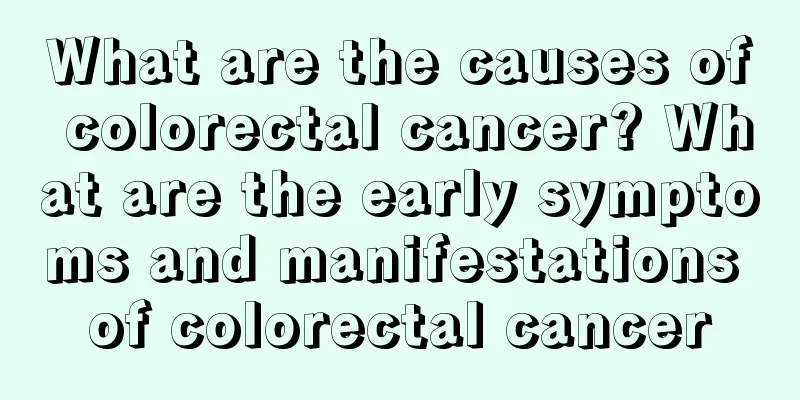What are the causes of colorectal cancer? What are the early symptoms and manifestations of colorectal cancer

|
What are the early symptoms and manifestations of colorectal cancer? Many people suffer from colorectal cancer due to irregular diet, which not only causes great physical pain, but also adds a lot of burden to life. As a common malignant tumor, the incidence of colorectal cancer remains high. Let's learn how to treat colorectal cancer. Early symptoms and manifestations of colorectal cancer 1. Changes in bowel habits Changes in bowel habits are the most common symptom of colorectal cancer. Many patients tend to confuse the early symptoms of colorectal cancer with common constipation, thus delaying treatment. As intestinal tumors grow, the excretion of feces will be hindered, causing changes in bowel habits. 2. Blood in the stool Intestinal cancer is caused by some symptoms in the stomach and intestines. Blood in the stool caused by intestinal cancer is often persistent and accompanied by mucus. At the same time, the urge to defecate will increase, and sometimes only some blood or mucus will be discharged. If the tumor grows far away from the anus, the incidence of blood in the stool will be lower. About 80% of patients with rectal cancer have blood in the stool. 3. Digestive tract symptoms The digestive tract symptoms caused by colorectal cancer are mostly manifested as abdominal distension, discomfort, indigestion, etc. The abdominal distension and pain caused by colorectal cancer are mostly intermittent in the early stage, and gradually become continuous in the later stage. Some patients will also experience intestinal obstruction, acute symptoms such as severe abdominal pain and obstructed gas discharge. There are also chronic intestinal obstruction, such as paroxysmal abdominal pain, hyperactive bowel sounds, constipation, blood and mucus in the stool, etc. 4. Abdominal mass About half of colorectal cancer patients will have abdominal masses, which are masses caused by the adhesion of the tumor to the intestinal omentum and surrounding tissues. They are irregular in nature and have a certain degree of mobility. In the late stage of colorectal cancer, the mass may be difficult to move due to the high degree of tumor infiltration. What are the causes of bowel cancer? Unreasonable diet structure The cause of colorectal cancer is related to an unreasonable dietary structure. Eating too much fatty, sweet, high-calorie, low-fiber food also hinders gastrointestinal motility, promotes the accumulation and absorption of toxins, and causes a high incidence of colorectal cancer. Chronic colon inflammation According to statistical investigations, the risk of chronic ulcerative colitis patients developing the disease is about ten times higher than that of normal people. The risk of malignant transformation of hemorrhagic ulcerative colitis is even greater. Fifty percent of patients with the disease course exceeding ten years will develop cancer. Environmental factors Environmental changes can also easily cause the occurrence of colorectal cancer. With the increasing modernization and industrialization of life, factors such as interior decoration, waste gas pollution, and pesticide abuse have led to a decrease in our immune ability, which is also a common cause of colorectal cancer. Genetics Genetics is also a major cause of colorectal cancer. 25% of colorectal cancer occurs in families with a history of colorectal cancer. In some families, most members are prone to polyps. If left unchecked, the incidence of colorectal cancer is also 25%. Elderly people over 50 years old should take various measures to prevent colorectal cancer. Because 50% of elderly people over 60 years old will develop large colorectal polyps. But we don't know which of these polyps of different sizes will develop into colorectal cancer. Treatment of Bowel Cancer 1. Surgical treatment (1) Radical resection plus regional lymph node dissection is often used for patients in stages I, II, and III. The scope of radical resection and the surgical method are determined according to the location of the tumor. For patients in stage IV who have intestinal obstruction or severe intestinal bleeding, radical surgery is not performed for the time being. Palliative resection can be performed to relieve symptoms and improve the patient's quality of life. (2) The basis of radical treatment of rectal cancer is surgery. Rectal surgery is more difficult than colon surgery. Common surgical methods include: transanal resection (very early stage near the anal verge), total mesorectal excision, low anterior resection, and transabdominal anal sphincter and abdominoperineal resection. For stage II and III rectal cancer, it is recommended to undergo radiation and chemotherapy before surgery to shrink the tumor and reduce the local tumor stage before radical surgery. 2. Comprehensive treatment (1) Adjuvant chemotherapy: Oxaliplatin combined with fluorouracil (5-fluorouracil) is the current standard treatment for stage III colorectal cancer and some patients with high-risk colorectal cancer. The treatment duration is 6 months. It is suitable for patients with rectal cancer who have not received neoadjuvant radiotherapy before surgery and who need adjuvant radiotherapy after surgery. (2) The treatment of IV colorectal cancer is mainly a comprehensive treatment plan with chemotherapy as the main treatment. Chemotherapy drugs include 5-fluorouracil, capecitabine, oxaliplatin, irinotecan, bevacizumab, cetuximab, panitumumab and other drugs. Commonly used chemotherapy regimens include: FOLFOX, XELOX, FOLFIRI, etc. On the basis of chemotherapy, targeted drug therapy (bevacizumab, cetuximab, panitumumab) can be combined as appropriate. 3. Radiation therapy At present, the most effective and researched treatment is the comprehensive treatment of surgery and radiotherapy, including preoperative radiotherapy, intraoperative radiotherapy, postoperative radiotherapy, etc., each with its own characteristics. Palliative radiotherapy is used for patients with advanced colorectal cancer, those with local tumor infiltration, and those with surgical contraindications to relieve symptoms and reduce pain. Nursing knowledge about colorectal cancer 1. Dietary adjustment for decreased blood count Colorectal cancer chemotherapy can cause bone marrow aplasia, especially the decline of white blood cells. In order to effectively prevent the decline of blood count, patients should supplement high-protein diet during chemotherapy, such as milk, soybeans, lean meat, pig's trotters, sea cucumbers, fish, animal liver, red dates, peanuts, walnuts, black fungus, carrots, red beans, etc. River crabs, black fish, beef, animal-made gelatin such as donkey hide gelatin (ejiao) and pig hide gelatin (roupi gelatin) can also help increase white blood cells. 2. Dietary conditioning for digestive tract toxicity Chemotherapy for colorectal cancer can cause oral mucositis, which manifests as mucosal congestion, edema, ulcers, pain, etc. At this time, you should keep your mouth clean, brush your teeth after eating, and supplement with high-nutrition liquid or liquid diet, such as lotus seed soup, snow fungus soup, milk, soy milk, crucian carp soup, etc. Avoid overheated, overly acidic and irritating foods when eating. In acute inflammation, you can hold ice in your mouth to reduce inflammatory exudation. If ulcers occur, you can add 0.1 g of crushed vitamin C to 20 ml of honey and hold it in your mouth 2 to 4 times a day. 3. Dietary conditioning and prevention of liver and kidney damage Some chemotherapy drugs can cause liver damage and increase transaminase. At this time, you should eat more bitter melon, mung bean sprouts, tea, mushrooms, fungus, Hericium erinaceus and other fungi, eat more fruits rich in vitamins, such as kiwi, peach, apple, grape, etc., drink more green tea, oolong tea, honey water. If the liver function is severely damaged, you can use 20 grams of Schisandra chinensis and 20 grams of wolfberry to stew crucian carp soup. |
<<: Ovarian cancer is a silent killer. 7 symptoms and warning signs of ovarian cancer
>>: What are the symptoms of bone cancer? What should patients with bone cancer eat?
Recommend
What are the key points to pay attention to when caring for patients with laryngeal cancer
The incidence of laryngeal cancer is mainly relat...
What medicine should I take for lung metastasis of cervical cancer
Speaking of cervical cancer, I believe we are not...
Symptoms of gastrointestinal flora imbalance
The gastrointestinal tract is the most important ...
Difficulty in defecation is like squeezing toothpaste
Both bowel movements and urine are related to hum...
What disease is chest tightness and back pain?
You may feel chest tightness, shortness of breath...
How much does pituitary tumor surgery cost?
The cost of pituitary tumor surgery ranges from t...
What is the best medicine for small cell lung cancer
What medicine is good for small cell lung cancer?...
Introduction to vitamin b1 anti-mosquito methods
In the hot summer, what bothers people most are m...
There are many little red spots on the soles of my feet
The growth of many small red spots on the body is...
How to make winter melon and clam soup?
Winter melon and clam soup is liked by most peopl...
The effect of chloramphenicol injection water external application
Chloramphenicol injection is not common in our da...
What to do if the shirt turns yellow after being stored for a long time
A white shirt makes people feel very formal and i...
Probiotic ingredients
Many people regard probiotics as health supplemen...
How to make dried roses | DIY tutorial on making dried roses
Roses represent strong love. Although this flower...
Living environment is very important in treating non-small cell lung cancer
There are many symptoms of late-stage non-small c...









